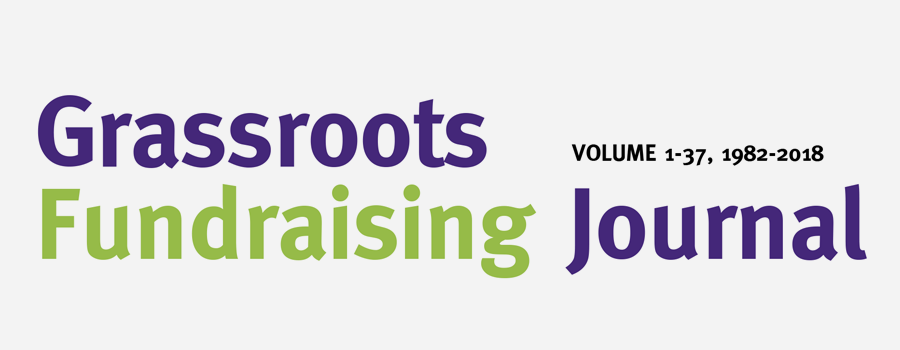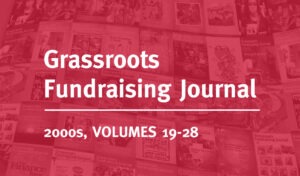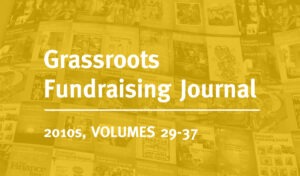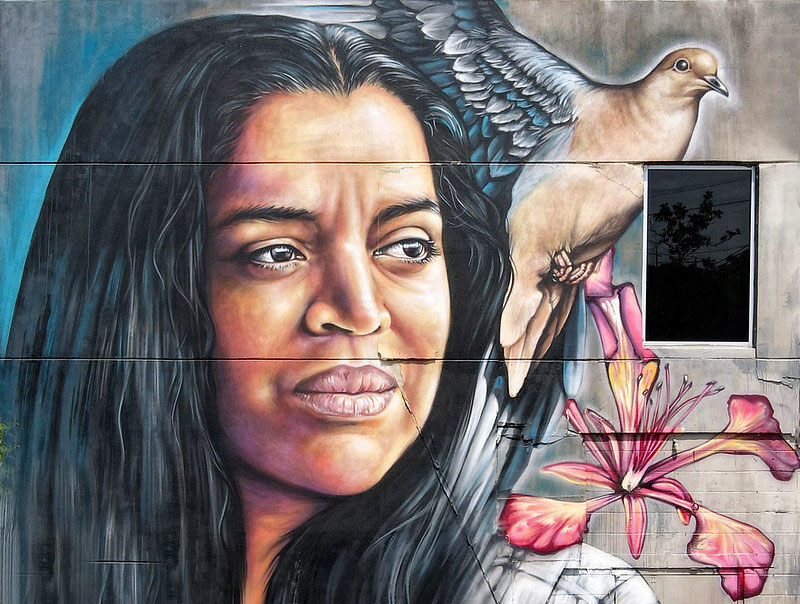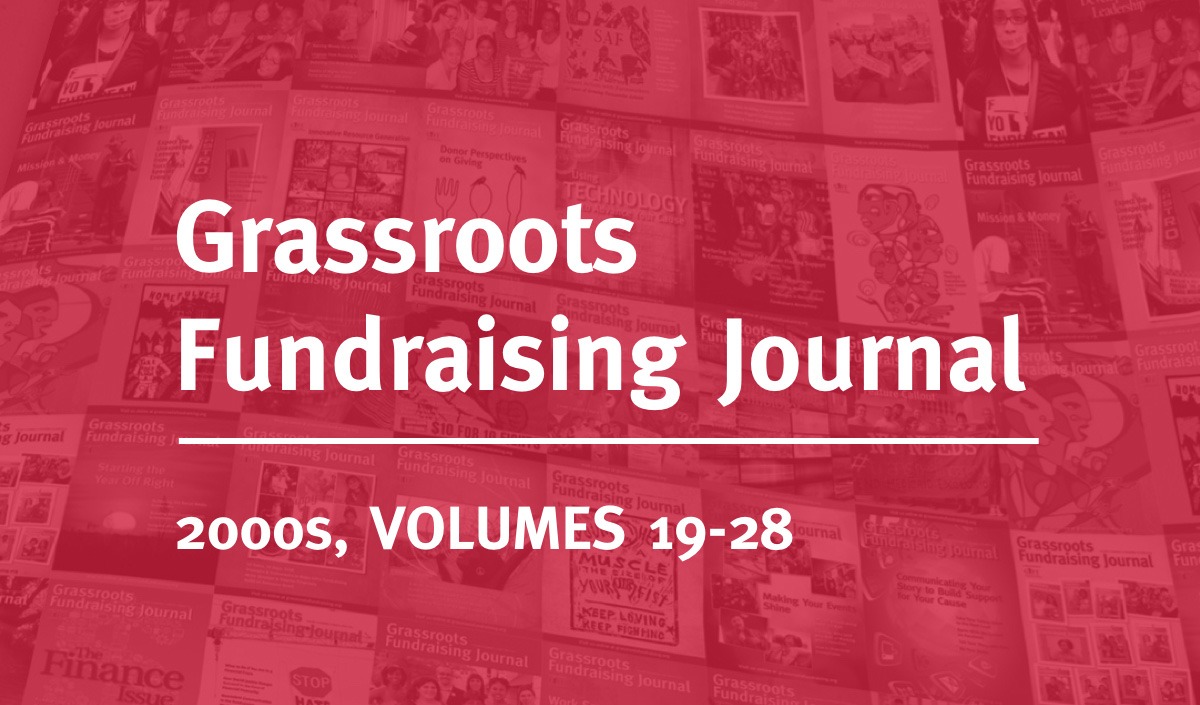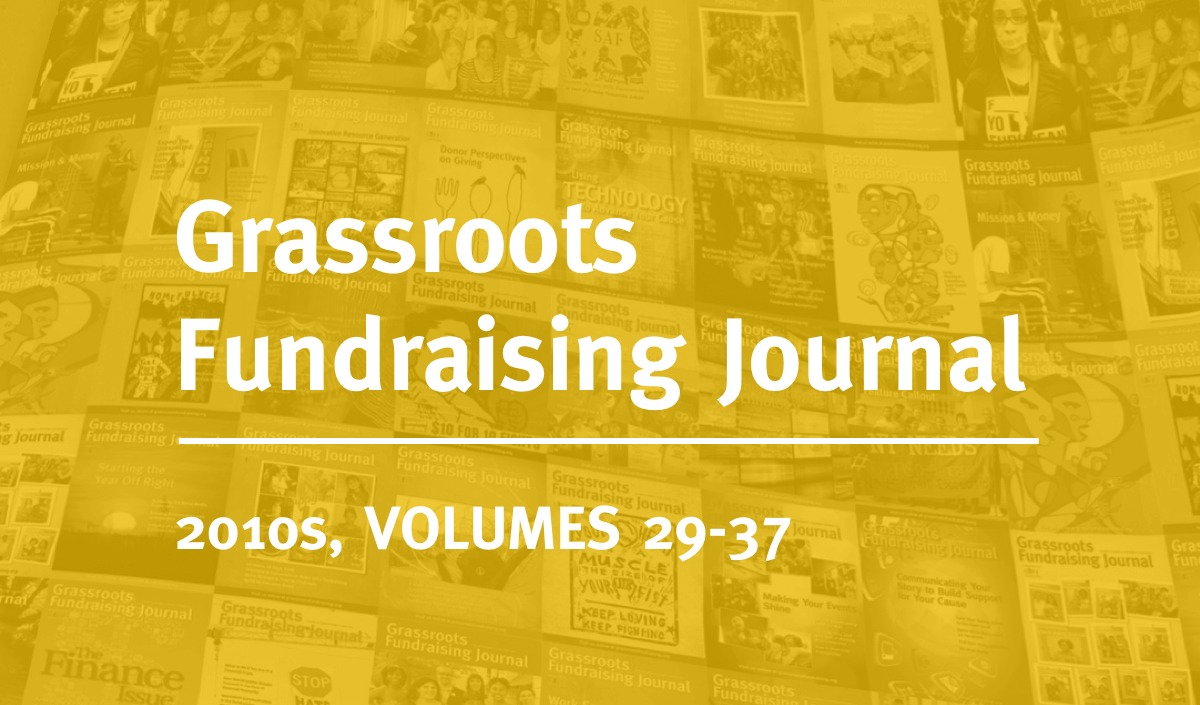
Editors’ note: This article, first published in print during May/June 2012, has been republished for Nonprofit Quarterly with minor updates.
GIFT 2012 Conference Keynotes
IN AUGUST, OVER 700 PEOPLE GATHERED at GIFT’s Money for Our Movements 2012 Conference to be challenged and inspired to think bigger and bolder about how to connect our fundraising work to our overall efforts for social justice. Below are excerpts of the speeches from our three plenary speakers. Watch video of their full speeches on GIFT’s website at grassrootsfundraising.org/conference.
EVERYONE CAN BE A MEMBER By Saru Jayaraman
Over 10 million workers nationwide are employed by the restaurant industry. The National Department of Labor reports that restaurant workers are the lowest-paid workers in America—below farmworkers and domestic workers. This is especially sad given that it is one of the most profitable and fastest-growing industries.
The minimum wage for tipped workers has been frozen for the past 21 years at $2.13. Most earn less than $3 per hour, so, for the most part, they live on our tips. The result is incredible poverty, as you can imagine. Almost every restaurant in America, including the finest dining restaurants, has at least one worker who is homeless or teetering on the brink of homelessness. We have people living under a bridge while working in Chef Emeril’s restaurant in New Orleans. Our studies show that 90 percent of restaurant workers do not have paid sick days, which means that two-thirds of the people who cook, prepare, and serve your food are doing so while sick. $2.13 is not enough for anybody.
Restaurant Opportunities Center (ROC) has grown rapidly mainly due to the demand of workers and employers. We have had to grow our resources to build the organization. We are not experts in grassroots fundraising—and a lot of our funding comes from foundations—but there are nevertheless a few things I can share.
We have been creative about how our 10,000 members can contribute to keeping our organizing and resource development aligned. We charge dues, which we use as a leadership development tool. Restaurant worker leaders have been the ones to lead the efforts to collect dues. We have collected them at meetings and other member-organized events, including ones where they showcase their talents in food, bartending, or art.
The member contribution strategy that is most lucrative is when workers donate part of their winnings from lawsuits. Be-cause ROC invests extensive resources to fight alongside workers to get employers to do the right thing and pay millions of dollars in back wages, our leaders instituted a rule that workers donate 10 percent of what they win back to ROC.
We have had large and small campaigns, but sometimes the small campaigns are lucrative in ways that we don’t expect. A couple of years ago, we were engaged in two huge campaigns involving thousands of workers in high profile places. In the middle of that, a group of twenty immigrant workers from a small café came to us for help because they had not been paid. We told them we were in the middle of these huge strategic campaigns, but we could help them self-organize. So we trained them, and they organized on their own, winning an amazing settlement that included paid sick days and holidays, vacation, and $200,000 in back wages. This amount is small compared to other campaigns we have been involved in, but unlike what we have seen with workers at high-end restaurants, these workers decided they wanted to give more than the 10 percent and ended up donating $25,000 to ROC. More importantly, we found out that the café is the restaurant in all of the Equinox gyms in New York, so the policy wins ended up affecting thousands of workers.
The biggest lesson for me from the past ten years has been that it is important to be creative and strategic about who our constituency actually is. You probably think that it is just restaurant workers. But we have actually completely changed our thinking over time. Our constituency has continually grown as ROC’s work and vision has expanded. It started with immigrant workers right after 9/11, then all workers—white, black, U.S. born—all over the country. Then it expanded to include employers who partner with us to do the right thing.
The ultimate frontier for us is consumers. Almost every single person in America is touched by the restaurant industry. We realized a couple of years ago that the ridiculously low minimum wage and lack of paid sick days would never change if we didn’t reach the widest possible audience. I don’t just mean the 10 mil-lion restaurant workers. Every single person who eats out needs to understand what is happening behind the kitchen door.
We weren’t getting very far in Congress because of the power of the opposition. Then something happened. Michael Pollan wrote The Omnivore’s Dilemma, and Eric Schlosser wrote Fast Food Nation, alongside several other books, causing an exploding interest in the restaurant industry and food.
Suddenly, consumers were asking, “Is this locally-sourced? Is this organic? Is this free-range chicken?”—and the industry was responding. Imagine if people asked, “Do your workers get paid sick days? Do your workers only get paid $2.13? Do you have free-range people and not just free-range chicken?” Imagine the impact that would have on the restaurant industry.
So we started engaging people as consumers and realized how much power there is in this role. This started informing our strategies of investing in books, YouTube videos, and movies to reach a wider and wider audience.
The lesson is not just that our members can be donors. But that our donors can be members. They can provide resources to the organization, and, most importantly, they can help us win. We recently worked with Congress to introduce a bill that would raise tip worker minimum wage to $5. This is the first congressional leadership we have seen on this issue in 15 years. We haven’t won it yet, but it is a huge milestone that was made possible due to reaching a wider and wider audience.
The greatest lesson for ROC is that this expanded vision has expanded our ability to raise resources—and our ability to win. We have to stop speaking just to ourselves. Everyone is impacted by the issues we care about. For me, there has never been a better moment than now to reach the widest possible group of hearts and minds, and to not just think about those people as donors, but as partners who can help us ultimately win.
Saru Jayaraman is co-founder and co-director of the Restaurant Opportunities Centers United (ROC-United) and an assistant professor at Brooklyn College.
10 WAYS TO TURN FUNDRAISING INTO ORGANIZING By Attica Woodson Scott
1. Know why you are here today and what brings you to this work.
We need to know and to understand why we are here. While I am a part of government, I am not of government. And while I am a part of the system, I am not of the system. I come to my work from grassroots, community-based movements. One of the many reasons that I became more deeply and directly involved with our political process is reflected in the words of my dear friend, Bob Wing: “If we fail to place fighting electoral racism at the very top of a racial justice agenda, people of color will continue to be effectively disenfranchised.”
I wanted to be in a position to push back on that trend because the only way that we are going to affect the kind of change that makes our movements unnecessary is if we elect to office the people who are cut from our cloth. So, I know why I am here. Why are you here?
2. Push back.
While at Kentucky Jobs with Justice and the National Conference for Community and Justice, I would often question why so much of our time had to go to the mundane task of asking for money. It took me some time
to begin to see the tangible difference that we were making through fundraising. Eventually, I shifted my thinking to accept the reality that our money-raising really was supporting our advocacy and public policy work. This became especially clear when I would sit down with immigrant workers who shared their stories of being able to finally join a union because of our support, or with a former felon who wanted to regain her right to vote and I connected her to the resources to make that happen. When those same individuals would donate to Kentucky Jobs with Justice, it taught me the lesson that every gift has value.
3. Fundraising is organizing, and organizing is building power.
When we talk about moving from protest movements to policy change, that takes money. When we talk about building a base of educated, informed and involved grassroots activists, that takes money. We need money for the buses and vans to transport our folks to state capitals, we need money to pay our childcare providers, we need money for the flyers, mailings, and phone banks.
4. Heal those wounds around money.
Before we can raise more money and build more of a base, we have some healing to do around money. While we are turning challenges into opportunities for our members, we also need to recognize that the financial sacrifice is real for many of the people that we serve, and often for ourselves. So, we heal, and then we look for opportunities to use fundraising to build power.
5. Have fun fundraising!
At Kentucky Jobs with Justice, we engage our board, staff, and allies in fundraising by inviting folks to donate their birthdays to our cause. Most people immediately say yes (even my son on his 16th birthday), and then they really get into setting a fundraising goal, writing the pitch, inviting friends to give, getting the donation updates, and posting periodic reminders. And they have fun in the process.
6. Take advantage of social networking tools, and remember to also keep it old school.
Yes, use Facebook, Twitter, and Instagram, AND pick up the phone, knock on doors, etc.
7. Build relationships that build power.
Build relationships across economic, racial, ethnic, gender, age, geographic, educational differences. In other words, move from being
“diverse” to being “inclusive.”
Sign up for our free newsletters
Subscribe to NPQ's newsletters to have our top stories delivered directly to your inbox.
By signing up, you agree to our privacy policy and terms of use, and to receive messages from NPQ and our partners.
8. Have an inside-outside strategy.
We often talk about the notion of an inside-outside strategy. Black Panther Party members in Knoxville, Tennessee put this strategy into action starting in the 1970s. They were strategic in having Black Panther Party members apply for positions at the University of Tennessee and other places where Black folks had been barred. They also had folks who stayed rooted in neighborhood work so that there was a change being pushed on the outside and folks making it happen on the inside.
9. Connect fundraising to intersecting issues.
Our fundraising builds power when we remember our brothers and sisters on reservations, our children with disabilities, our queer friends who commit suicide because of bullying, our African, Asian, and Latino youth who still have a DREAM, women who can actually make decisions about our ovaries for ourselves, former felons who still do not have the right to vote, our elders who feel forgotten, and our natural environment that is being destroyed. When we connect our issues, we raise more money and build stronger movements.
10. Pushing Onward With Everlasting Resistance.
That is POWER in the words of Southern civil rights activist Anne Braden. What keeps me hopeful is seeing all of the big ideas that are taking shape on different fronts like electoral organizing. We are building POWER when we build bridges across community and resource stratifications and across lines of difference, both real and imagined. We are building power when we ask ourselves: Is our work intentional? Is it inclusive? Is our movement accessible—physically, culturally, geographically? Do people feel connected and involved?
At the end of the day, we must use the money that we raise to build strong, powerful movements that reflect the words of activist and organizer Grace Lee Boggs: “This is what the Movement does. It tells individuals that they are somebody, that they can make a difference. A movement creates hope, it empowers human beings, advances them to a new plateau of consciousness and self-consciousness, creativity and social responsibility.”
Attica Woodson Scott is the District 1 representative to Louisville Metro Council and is the former coordinator of Kentucky Jobs with Justice.
WHAT IS OUR DEMAND? By Kim Klein
Inequality is becoming more and more profound. When we look at the effects of inequality, we see some fascinating information, which public health activists Kate Pickett and Richard Wilkinson compiled in their book The Spirit Level: Why Greater Equality Makes Societies Stronger.
Pickett and Wilkinson looked at a number of serious social problems and asked why these problems were so much worse in some developed countries than others. Put more directly: why is the United States the leader among developed countries in infant mortality, homicide, prison rates, teen pregnancy, and substance abuse? The answer they arrived at after analyzing all the data they compiled is that the United States is also the leader in income inequality.
Picket and Wilkinson come to this stunning conclusion: “Economic growth, for so long the great engine of progress, has, in the rich countries, largely finished its work. Further improvements in the quality of life now depend on the community and how we relate to each other.”
The reality that economic progress has done its work re-quires sitting quietly for awhile in order to truly take it in. This is not a small insight; acting on it will require retooling how we think. What this means is that a person who earns, for example, $100,000 will not necessarily have a higher quality of life by earning $200,000. They won’t live longer, be any less likely to be shot or to have a stroke, or to be an alcoholic. They would be better off moving to Finland, though.
A recent Christian Science Monitor reports, “The standard of living for American has fallen longer and more steeply over the past three years than at any time since the US government began recording it five decades ago.” The quality of life for everyone in the United States is going down and will continue to do so.
For poor people—who we have more of every day—a drop in “quality of life” is disastrous or even fatal.
As a person who makes her living in the nonprofit sector, I now need to think about how to address pressing social problems without relying on any of the old ideas about economic growth, even the ones that were progressive. What kind of wealth will we need to create in a post-capitalist society, and how exactly will we pursue “a quality of life that depends on community and how we relate to each other”?
And as a fundraiser, I have to ask myself the question: “How will this affect fundraising?”
The great opportunity here is to examine some of the assumptions we have long made about fundraising and ask if they are still true.
Assumption One: We can raise the money we need for the work we do if we only have a good board, good staff, good infrastructure, and deep dedication to best practice.
That is not true. We will only raise the money we need when we have a fair and just tax structure. When we stop thinking that corporations are people and money is speech. When we change the government to really be of, by, and for the people.
We will only have that government when we have some deep and robust conversations about what should be funded publicly and what should be funded privately. I always ask my clients, “How do you think you should be funded?” I am amazed by how few have ever thought about it. They wonder, “How can we get the money?” but they need to first wonder, “How should we get the money?”
There is enough money in the United States for us to be the country we want, but that money has to be seriously redistributed. All nonprofits, whether they get government funding or not, must engage in discussions of tax policy.
Assumption Two: Conversation is not action. Conversation comes from a Latin word, “Conversare,” which means to turn—to turn together, to turn to one another, to face one another. This is what people do when they converse. This is action. We deeply believe that all of us have the right to an opinion, but nobody is going to form an opinion if they don’t think anyone is ever going to ask them their opinion. And so we have a population that is, by and large, not engaged—less than 50 percent of people who can vote, actually do. About 50 percent of people who could volunteer actually do.
If we want people to be engaged, we need to have conversations. And who, really, has more conversations than people in fundraising? When we ask someone for money, we have their attention. If you really want people to be engaged, ask them for money. But think of the conversation itself as action. Stop measuring everything in dollars raised.
Assumption Three: Foundations should give more money to social justice organizations and that we, along with our allies in the foundation world, should pressure them to give more grants to our kind of work.
Organizations spend hours on this, working with the many progressive funders that exist now. We all work together, and we have convenings. The funders form affinity groups, and they have convenings. And then we do our best to be invited to these convenings.
But do the math: Last year, total foundation giving was almost $42 billion. Research shows that about 12 percent of that went to social justice—about $4.4 billion. $4.4 billion is a lot, right? Hardly. $4.4 billion is less than the amount of money the top 1 percent saved in one month from the Bush tax cuts that were extended by Obama. Even if all $42 billion of foundation funding were to go to social justice, it would not turn this country around. The Super PAC Restore our Future, which supports Mitt Romney, has spent almost $62 billion this year alone.
What we have that the top one percent doesn’t have is numbers of people. The money is in people—lots of people. So stop waiting for foundations to become something else. Work with those who get funded to do good work. But spend most of your time where most of the money is—with people.
In a world where economic progress is no longer important, what all of us need to learn and practice is how we relate to each other and how we build community—skills we grassroots activists already have. We know how to take care of each other and how to share ideas and share space. But we have forgotten some of this in our efforts to brand ourselves, be professional, and create deliverables and outcomes. We need to stop looking at our dashboard and start looking at each other.
Kim Klein is the founder and publisher emerita of the Journal.

